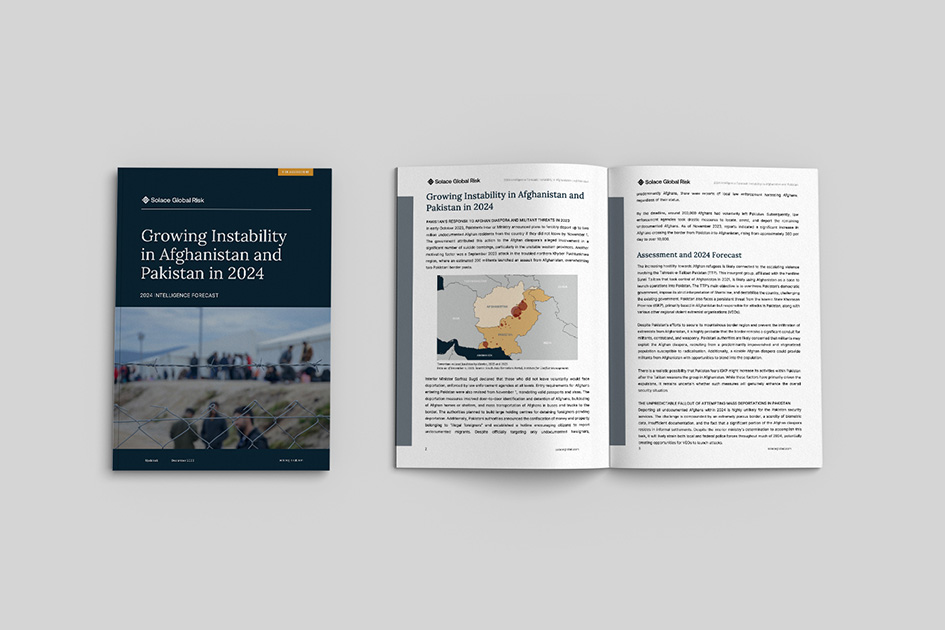Evacuations from High-Risk Locations Call +44 (0)1202 308810 or Contact Us →
Growing Instability in Pakistan and Afghanistan in 2024

Pakistan’s Response to Security Threats from Afghan Diaspora
In early October 2023, Pakistan’s Interior Ministry announced plans to forcibly deport up to two million undocumented Afghan residents from the country if they did not leave by November 1. The government attributed this action to the Afghan diaspora’s alleged involvement in a significant number of suicide bombings, particularly in the unstable western provinces. Another motivating factor was an attack in September 2023 in the troubled northern Khyber Pakhtunkhwa region. Around 200 militants launched an assault from Afghanistan, overwhelming two Pakistani border posts.
As part of our comprehensive Global Risk Intelligence Forecast 2024, this analysis explores Pakistan’s aggressive deportation measures and tightened entry requirements that have sparked concerns about regional stability.
Sweeping Deportation Measures and Stricter Entry Requirements
Interior Minister Sarfraz Bugti declared that those who did not leave voluntarily would face deportation, enforced by law enforcement agencies at all levels. Entry requirements for Afghans entering Pakistan were also revised from November 1, mandating valid passports and visas.
The deportation measures involved door-to-door identification and detention of Afghans, bulldozing of Afghan homes or shelters, and mass transportation of Afghans in buses and trucks to the border. The authorities planned to build large holding centres for detaining foreigners pending deportation. Additionally, Pakistani authorities announced the confiscation of money and property belonging to “illegal foreigners” and established a hotline encouraging citizens to report undocumented migrants.
Despite officially targeting only undocumented foreigners, predominantly Afghans, there were reports of local law enforcement harassing Afghans, regardless of their status. By the deadline, around 200,000 Afghans had voluntarily left Pakistan. Subsequently, law enforcement agencies took drastic measures to locate, arrest, and deport the remaining undocumented Afghans.
As of November 2023, reports indicated a significant increase in Afghans crossing the border from Pakistan into Afghanistan. The numbers rose from approximately 300 per day to over 10,000.
In this report:
- Growing Instability in Pakistan and Afghanistan in 2024
- Pakistan’s response to Afghan diaspora and militant threats in 2024
- Assessment and 2024 Forecast
- The unpredictable fallout of attempting mass deportations in Pakistan
- Afghanistan’s refugee influx and humanitarian aid shortage
- Balancing Taliban relations and tackling TTP threats
- Implications of Pakistan’s deportation policy in 2024

More from the 2024 Intelligence Forecast
South Africa’s Economic Future Amidst Threats of Civil Unrest in 2024
The Sahel Deterioration and Violence in West Africa in 2024
Increased Militancy in Uganda in 2024
Civil unrest is expected to cause significant disruption in South Africa in 2024. Despite this, many companies are increasingly choosing to expand or establish a presence in the country for various compelling reasons.
The Sahel, characterised by growing instability triggered by poverty, food insecurity, water scarcity and challenges presented by terrorism, rebel groups and poor governance, faces threats of further deterioration of security in 2024.
Throughout 2023, the Allied Democratic Forces (ADF) has escalated its attacks in Uganda. Failing to address underlying issues could exacerbate the ADF’s influence in 2024, posing long-term challenges for Ugandan authorities.